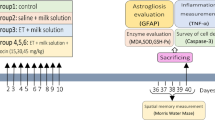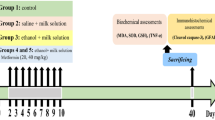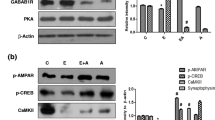Abstract
Rationale
Clinical and experimental evidence have demonstrated that alcohol consumption during pregnancy can disrupt brain development, leading to a variety of behavioral alterations including hyperactivity, motor dysfunction, and cognitive deficits in offsprings. Alcohol-induced neurocognitive deficits are associated with activation of oxidative-inflammatory cascade coupled with extensive apoptotic neurodegeneration in different brain regions.
Objectives
The present study was designed with an aim to investigate the protective effect of curcumin, a principal curcuminoid present in the Indian spice turmeric, against alcohol-induced cognitive deficits, neuroinflammation, and neuronal apoptosis in rat pups postnatally exposed to ethanol.
Methods and results
Male Wistar rat pups were administered ethanol (5 g/kg, 12 % v/v) by intragastric intubation on postnatal days (PD) 7, 8, and 9 and were treated with curcumin (30 and 60 mg/kg) from PD 6 to 28. Performance of ethanol-exposed pups that did not receive curcumin was significantly impaired as evaluated in both Morris water maze and elevated plus maze tasks recorded by using computer tracking. Cognitive deficit was associated with enhanced acetylcholinesterase activity, increased neuroinflammation (oxidative-nitrosative stress, TNF-α, IL-1β, and TGF-β1), and neuronal apoptosis (NF-κβ and caspase 3) in both cerebral cortex and hippocampus of ethanol-exposed pups. Chronic treatment with curcumin significantly ameliorated all the behavioral, biochemical, and molecular alterations in different brain regions of ethanol-exposed pups.
Conclusions
The current study demonstrates the possible involvement of oxidative-inflammatory cascade-mediated apoptotic signaling in cognitive deficits associated with postnatal ethanol exposure and points towards the neuroprotective potential of curcumin in mitigating alcohol-induced behavioral, biochemical, and molecular deficits.












Similar content being viewed by others
References
Abel EL, Sokol RJ (1991) A revised conservative estimate of the incidence of FAS and its economic impact. Alcohol Clin Exp Res 15:514–524
Andres-Lacueva C, Shukitt-Hale B, Galli RL, Jauregui O, Lamuela-Raventos RM, Joseph JA (2005) Anthocyanins in aged blueberry-fed rats are found centrally and may enhance memory. Nutr Neurosci 8:111–120
Balduini W, Costa LG (1989) Effect of ethanol on muscarinic receptor-stimulated phosphoinositide metabolism during brain development. J Pharmacol Exp Ther 250:541–547
Basheer R, Rainnie DG, Porkka-Heiskanen T, Ramesh V, McCarley RW (2001) Adenosine, prolonged wakefulness, and A1-activated NF-kappaB DNA binding in the basal forebrain of the rat. Neuroscience 104:731–739
Basnet P, Skalko-Basnet N (2011) Curcumin: an anti-inflammatory molecule from a curry spice on the path to cancer treatment. Molecules 16:4567–4598
Bharti AC, Donato N, Singh S, Aggarwal BB (2003) Curcumin (diferuloylmethane) down-regulates the constitutive activation of nuclear factor-kappa B and I kappa B alpha kinase in human multiple myeloma cells, leading to suppression of proliferation and induction of apoptosis. Blood 10:1053–1062
Buhrmann C, Mobasheri A, Busch F, Aldinger C, Stahlmann R, Montaseri A, Shakibaei M (2011) Curcumin modulates nuclear factor kappaB (NF-kappaB)-mediated inflammation in human tenocytes in vitro: role of the phosphatidylinositol 3-kinase/Akt pathway. J Biol Chem 286:28556–28566
Claiborne A (1985) Catalase activity. In: Greenwald RA (ed) Handbook of methods for oxygen radical research. CRC, Boca Raton, pp 283–284
Coleman LG Jr, He J, Lee J, Styner M, Crews FT (2011) Adolescent binge drinking alters adult brain neurotransmitter gene expression, behavior, brain regional volumes, and neurochemistry in mice. Alcohol Clin Exp Res 35(4):671–688
Crews F, Nixon K, Kim D, Joseph J, Shukitt-Hale B, Qin L, Zou J (2006) BHT blocks NF-kB activation and ethanol-induced brain damage. Alcohol Clin Exp Res 30:1938–1949
Cumiskey D, Butler MP, Moynagh PN, O'connor JJ (2007) Evidence for a role for the group I metabotropic glutamate receptor in the inhibitory effect of tumor necrosis factor-alpha on long-term potentiation. Brain Res 1136:13–19
Edwards EM, Werler MM (2006) Alcohol consumption and time to recognition of pregnancy. Matern Child Health J 10(6):467–472
Ellman GL, Courtney DK, Andres V, Featherstone RM (1961) A new and rapid colorimetric determination of acetylcholinesterase activity. Biochem Pharmacol 7:88–95
Frautschy SA, Hu W, Kim P, Miller SA, Chu T, Harris-White ME, Cole GM (2001) Phenolic anti-inflammatory antioxidant reversal of Abeta-induced cognitive deficits and neuropathology. Neurobiol Aging 22:993–1005
Goodlett CR, Peterson SD (1995) Sex differences in vulnerability to developmental spatial learning deficits induced by limited binge alcohol exposure in neonatal rats. Neurobiol Learn Mem 64:265–275
Green LC, Wagner DA, Glogowski J, Skipper PL, Wishnok JS, Tannenbaum SR (1982) Analysis of nitrate, nitrite, and [15 N] nitrate in biological fluids. Anal Biochem 126:131–138
Guerri C (1998) Neuroanatomical and neurophysiological mechanisms involved in central nervous system dysfunctions induced by prenatal alcohol exposure. Alcohol Clin Exp Res 22:304–312
Guerri C (2002) Mechanisms involved in central nervous system dysfunctions induced by prenatal ethanol exposure. Neurotoxicol Teratol 4:327–335
Gupta B, Ghosh B (1999) Curcuma longa inhibits TNF-alpha induced expression of adhesion molecules on human umbilical vein endothelial cells. Int J Immunopharmacol 21:745–757
Han SS, Keum YS, Seo HJ, Surh YJ (2002) Curcumin suppresses activation of NFkappaB and AP-1 induced by phorbol ester in cultured human promyelocytic leukemia cells. J Biochem Mol Biol 35:337–342
Heaton MB, Paiva M, Madorsky I, Shaw G (2003) Ethanol effects on neonatal rat cortex: comparative analyses of neurotrophic factors, apoptosis-related proteins, and oxidative processes during vulnerable and resistant periods. Brain Res Dev Brain Res 145:249–262
Henderson GI, Chen JJ, Schenker S (1999) Ethanol, oxidative stress, reactive aldehydes, and the fetus. Front Biosci 4:541–550
Ikonomidou C, Bosch F, Miksa M, Bittigau P, Vöckler J, Dikranian K, Tenkova TI, Stefovska V, Turski L, Olney JW (1999) Blockade of NMDA receptors and apoptotic neurodegeneration in the developing brain. Science 283:70–74
Ikonomidou C, Bittigau P, Ishimaru MJ, Wozniak DF, Koch C, Genz K, Price MT, Stefovska V, Hörster F, Tenkova T, Dikranian K, Olney JW (2000) Ethanol-induced apoptotic neurodegeneration and the fetal alcohol syndrome. Science 287:1056–1060
Izumi Y, Kitabayashi R, Funatsu M, Izumi M, Yuede C, Hartman RE, Wozniak DF, Zorumski CF (2005) A single day of ethanol exposure during development has persistent effects on bi-directional plasticity, N-methyl-d-aspartate receptor function and ethanol sensitivity. Neuroscience 136:269–279
Jevtovic-Todorovic V, Hartman RE, Izumi Y, Benshoff ND, Dikranian K, Zorumski CF, Olney JW, Wozniak DF (2003) Early exposure to common anesthetic agents causes widespread neurodegeneration in the developing rat brain and persistent learning deficits. J Neurosci 23:876–882
Jiang J, Wang W, Sun YJ, Hu M, Li F, Zhu DY (2007) Neuroprotective effect of curcumin on focal cerebral ischemic rats by preventing blood–brain barrier damage. Eur J Pharmacol 561:54–62
Jollow DJ, Mitchell JR, Zampaglione N, Gillette JR (1974) Bromobenzene induced liver necrosis. Protective role of glutathione and evidence for 3,4-bromobenzenoxide as the hepatotoxic intermediate. Pharmacology 11:151–169
Jones KL, Smith DW (1973) Recognition of the fetal alcohol syndrome in early infancy. Lancet 2:999–1001
Jung ME, Gatch MB, Simpkins JW (2005) Estrogen neuroprotection against the neurotoxic effects of ethanol withdrawal: potential mechanisms. Exp Biol Med (Maywood, NJ) 230:8–22
Kaskutas LA (2000) Understanding drinking during pregnancy among urban American Indians and African Americans: health messages, risk beliefs, and how we measure consumption. Alcohol Clin Exp Res 24(8):1241–1250
Kim H, Park BS, Lee KG, Choi CY, Jang SS, Kim YH, Lee SE (2005) Effects of naturally occurring compounds on fibril formation and oxidative stress of beta-amyloid. J Agric Food Chem 53:8537–8541
Kono Y (1978) Generation of superoxide radical during autoxidation of hydroxylamine and an assay for superoxide dismutase. Arch Biochem Biophys 186:189–195
Kontush K, Schekatolina S (2004) Vitamin E in neurodegenerative disorders: Alzheimer’s disease. Ann N Y Acad Sci 1031:249–262
Kuhad A, Bishnoi M, Tiwari V, Chopra K (2009) Suppression of NF-kappabeta signaling pathway by tocotrienol can prevent diabetes associated cognitive deficits. Pharmacol Biochem Behav 92:251–259
Kukielka E, Dicker E, Cederbaum AI (1994) Increased production of reactive oxygen species by rat liver mitochondria after chronic ethanol treatment. Arch Biochem Biophys 309:377–386
Kumar VMH, Gupta YK (2002) Intracerebroventricular administration of colchicine produces cognitive impairment associated with oxidative stress in rats. Pharmacol Biochem Behav 73:565–571
Lan Z, Liu J, Chen L, Fu Q, Luo J, Qu R, Kong L, Ma S (2012) Danggui-Shaoyao-San ameliorates cognition deficits and attenuates oxidative stress-related neuronal apoptosis in d-galactose-induced senescent mice. J Ethnopharmacol 141(1):386–395
Lau FC, Shukitt-Hale B, Joseph JA (2005) The beneficial effects of fruit polyphenols on brain aging. Neurobiol Aging 1:128–132
Marino MD, Aksenov MY, Kelly SJ (2004) Vitamin E protects against alcohol-induced cell loss and oxidative stress in the neonatal rat hippocampus. Int J Dev Neurosci 22:363–377
Mattson SN, Riley EP (1998) A review of the neurobehavioral deficits in children with fetal alcohol syndrome or prenatal exposure to alcohol. Alcohol Clin Exp Res 22:279–294
Mattson SN, Riley EP, Gramling L, Delis DC, Jones KL (1997) Heavy prenatal alcohol exposure with or without physical features of the fetal alcohol syndrome leads to IQ deficits. J Pediatr 131:718–721
McAfoose J, Baune BT (2009) Evidence for a cytokine model of cognitive function. Neurosci Biobehav Rev 33:355–366
Mitchell JJ, Paiva M, Heaton MB (1999) The antioxidants vitamin E and beta-carotene protect against ethanol-induced neurotoxicity in embryonic rat hippocampal cultures. Alcohol 17:163–168
Molina-Jijón E, Tapia E, Zazueta C, El Hafidi M, Zatarain-Barrón ZL, Hernández-Pando R, Medina-Campos ON, Zarco-Márquez G, Torres I, Pedraza-Chaverri J (2011) Curcumin prevents Cr(VI)-induced renal oxidant damage by a mitochondrial pathway. Free Radic Biol Med 51:1543–1557
Moon DO, Kim MO, Choi YH, Park YM, Kim GY (2010) Curcumin attenuates inflammatory response in IL-1beta-induced human synovial fibroblasts and collagen-induced arthritis in mouse model. Int Immunopharmacol 10:605–610
Morris RG, Garrud P, Rawlins JN, O'Keefe J (1982) Place navigation impaired in rats with hippocampal lesions. Nature 297:681–683
Mount HTJ, Dreyfus CF, Black IB (1994) Muscarinic stimulation promotes cultured Purkinje cell survival: a role for acetylcholine in cerebellar development? J Neurochem 63:2065–2073
Murray J, Taylor SW, Zhang B, Ghosh SS, Capaldi RA (2003) Oxidative damage to mitochondrial complex I due to peroxynitrite: identification of reactive tyrosines by mass spectrometry. J Biol Chem 278:37223–37230
Mythri RB, Jagatha B, Pradhan N, Andersen J, Bharath MM (2007) Mitochondrial complex I inhibition in Parkinson's disease: how can curcumin protect mitochondria? Antioxid Redox Signal 9:399–408
Oberdoerster J, Kamer AR, Rabin RA (1998) Differential effect of ethanol on PC12 cell death. J Pharmacol Exp Ther 287:359–365
Pirlich M, Kiok K, Sandig G, Lochs H, Grune T (2002) Alpha-lipoic acid prevents ethanol-induced protein oxidation in mouse hippocampal HT22 cells. Neurosci Lett 328:93–96
Qin L, He J, Hanes RN, Pluzarev O, Hong JS, Crews FT (2008) Increased systemic and brain cytokine production and neuroinflammation by endotoxin following ethanol treatment. J Neuroinflammation 5:10
Raghavendra V, Kulkarni SK (2001) Possible antioxidant mechanism in melatonin reversal of aging and chronic ethanol-induced amnesia in plus-maze and passive avoidance memory tasks. Free Radic Biol Med 30:595–602
Reddy SK, Husain K, Schlorff EC, Scott RB, Somani SM (1999) Dose response of ethanol ingestion on antioxidant defense system in rat brain subcellular fractions. Neurotoxicology 20:977–987
Rico EP, Rosemberg DB, Dias RD, Bogo MR, Bonan CD (2007) Ethanol alters acetylcholinesterase activity and gene expression in zebrafish brain. Toxicol Lett 174:25–30
Sharma M, Gupta YK (2002) Chronic treatment with trans resveratrol prevents intracerebroventricular streptozotocin induced cognitive impairment and oxidative stress in rats. Life Sci 71:2489–2498
Shukla PK, Khanna VK, Ali MM, Khan MY, Srimal RC (2008) Anti-ischemic effect of curcumin in rat brain. Neurochem Res 33:1036–1043
Song C (2002) The effect of thymectomy and IL-1 on memory: implications for the relationship between immunity and depression. Brain Behav Immun 16:557–568
Spong CY, Abebe DT, Gozes I, Brenneman DE, Hill JM (2001) Prevention of fetal demise and growth restriction in a mouse model of fetal alcohol syndrome. J Pharmacol Exp Ther 297:774–779
Stratton K, Howe C, Battaglia F (eds) (1996) Fetal alcohol syndrome diagnosis, epidemiology, prevention and treatment. Institute of Medicine, National Academy Press, Washington, DC, pp 4–21
Ströfer M, Jelkmann W, Depping R (2011) Curcumin decreases survival of Hep3B liver and MCF-7 breast cancer cells: the role of HIF. Strahlenther Onkol 187:393–400
Tiwari V, Chopra K (2011) Resveratrol prevents alcohol-induced cognitive deficits and brain damage by blocking inflammatory signaling and cell death cascade in neonatal rat brain. J Neurochem 117:678–690
Tough S, Tofflemire K, Clarke M, Newburn-Cook C (2006) Do women change their drinking behaviors while trying to conceive? An opportunity for preconception counseling. Clin Med Res 4(2):97–105
Tuzcu M, Baydas G (2006) Effect of melatonin and vitamin E on diabetes-induced learning and memory impairment in rats. Eur J Pharmacol 537:106–110
Uysal M, Kutalp G, Ozdemirler G, Aykaç G (1989) Ethanol-induced changes in lipid peroxidation and glutathione content in rat brain. Drug Alcohol Depend 23:227–230
Wang HM, Zhao YX, Zhang S, Liu GD, Kang WY, Tang HD, Ding JQ, Chen SD (2010) PPARgamma agonist curcumin reduces the amyloid-beta-stimulated inflammatory responses in primary astrocytes. J Alzheimers Dis 20:1189–1199
Wills ED (1965) Mechanism of lipid peroxide formation in animals. Biochem J 99:667–676
Wozniak DF, Zorumski CF (2005) A single day of ethanol exposure during development has persistent effects on bi-directional plasticity, N-methyl-d-aspartate receptor function and ethanol sensitivity. Neurosci 136:269–279
Xu Y, Ku B, Cui L, Li X, Barish PA, Foster TC, Ogle WO (2007) Curcumin reverses impaired hippocampal neurogenesis and increases serotonin receptor 1A mRNA and brain-derived neurotrophic factor expression in chronically stressed rats. Brain Res 1162:9
Yoshiyama Y, Kojima A, Ishikawa C, Arai K (2010) Anti-inflammatory action of donepezil ameliorates tau pathology, synaptic loss, and neurodegeneration in a tauopathy mouse model. J Alzheimers Dis 22(1):295–306
Acknowledgements
Financial assistance sanctioned to Professor Kanwaljit Chopra under the DST PURSE Award is gratefully acknowledged. The senior research fellowship granted to Mr. Vinod Tiwari by the Indian Council of Medical Research is also gratefully acknowledged.
Conflict of interest
The authors declare that they have no competing financial interests.
Author information
Authors and Affiliations
Corresponding author
Rights and permissions
About this article
Cite this article
Tiwari, V., Chopra, K. Attenuation of oxidative stress, neuroinflammation, and apoptosis by curcumin prevents cognitive deficits in rats postnatally exposed to ethanol. Psychopharmacology 224, 519–535 (2012). https://doi.org/10.1007/s00213-012-2779-9
Received:
Accepted:
Published:
Issue Date:
DOI: https://doi.org/10.1007/s00213-012-2779-9




